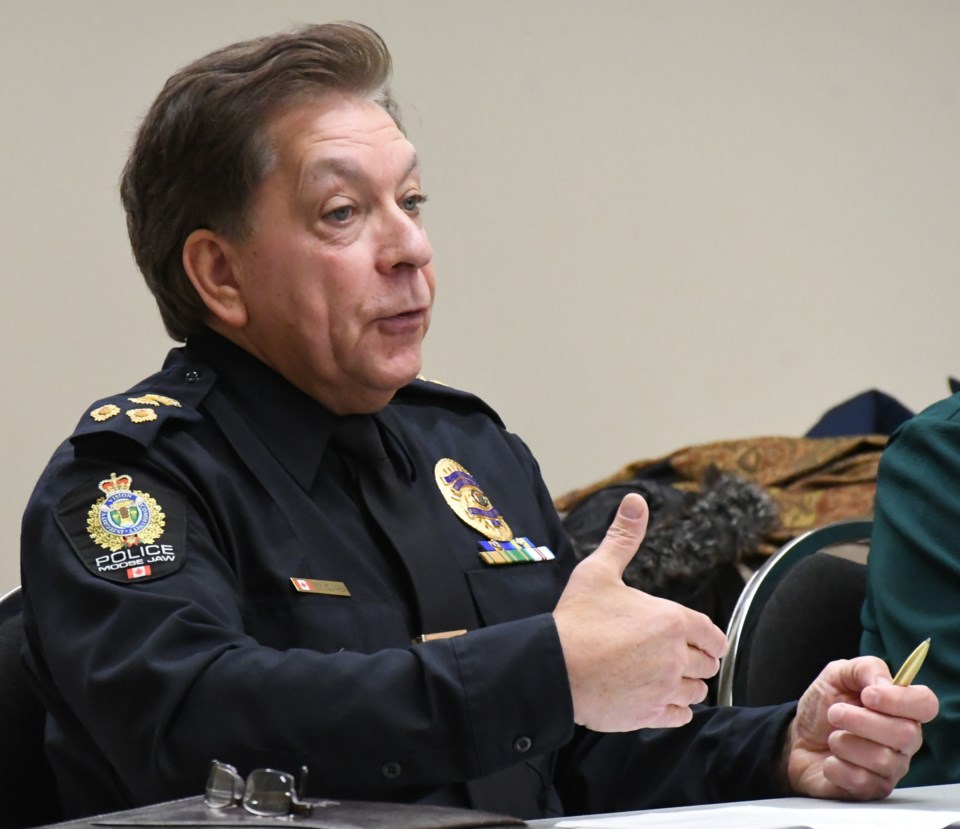Police Chief Rick Bourassa was diplomatic but blunt in his criticisms of the provincial government’s decision to create a marshals’ service, which he believes will infringe on municipal jurisdictions and steal experienced members.
The topic arose during the Board of Police Commissioner’s April 10 meeting after Commissioner Doug Blanc spoke about the financial challenges the Moose Jaw Police Service (MJPS) is experiencing because the government is forcing the agency to handle its responsibilities.
Blanc pointed out that the province has failed to fund the MJPS’s Internet Child Exploitation (ICE) unit, is forcing the agency to spend over $142,000 annually to manage court prisoners, is mandating the organization pay $231,000 starting in 2025 and $166,800 annually thereafter to handle 911 expenses and is paying only a small fraction of the victim services program.
Meanwhile, two years ago, the Ministry of Corrections, Policing and Public Safety announced it would create a 70-person marshal service for $20 million but failed to include vehicles, equipment, weapons or buildings in that amount, he continued.
“I have a fear that when this program comes forward, they’re going to be looking for … some experienced officers that are not going to be at the lower end of the pay scale, so to speak — they’re going to be at the mid or upper (range),” Blanc said.
He added that he expected the marshals’ program to increase to over $40 million because of the extra items it needs, while it may steal experienced Moose Jaw officers.
The legislature is empowered to enact legislation and used that power several weeks ago to create the marshals’ service, Bourassa said. He couldn’t say anything publicly then because MLAs were debating it and he didn’t want to influence their decisions.
However, now that the legislation has passed … .
“I make … comments quietly behind the scenes when we’re consulted by the folks in the ministry, which did not happen. There was no consultation on this … (and) we were taken by surprise in this,” the chief said.
Police chiefs attended the Throne Speech in 2022 and were briefed beforehand about the initiative, with ministry officials saying “it’s just a concept” that would be a highly trained and heavily equipped tactical unit travelling around the province, he recalled.
That explanation has changed and the marshals’ service will now “engage in complex investigations.” This concerned the chief since he expected jurisdictional issues to arise with another agency conducting investigations here.
“So I’m not really clear on what the mandate for that service will be … ,” Bourassa said. “I have provided my input to the ministry quietly for several years and my input has been (that) it is not the correct way to go.”
Instead, the province should give more money and resources to well-established police services with existing infrastructure while they can develop plans to pursue crimes, he added.
Bourassa sits on several national committees and regularly hears from other provinces about how envious they are of the collegial working relationship Saskatchewan police services have. For example, he regularly speaks with the chief in Estevan about matters and shares information.
“It’s worked extremely well. Adding an additional police service into that that has a completely different governance structure and … mandate from the rest of us will not be useful,” he said, noting other Canadian police services face jurisdictional problems because different agencies are involved in matters.
“I think there’s a better way to do it,” Bourassa added. “I would certainly be happy to engage in further consultation about it.”
One board commissioner said Moose Jaw already struggles to recruit officers, so the new marshals’ service will end up “poaching” experienced members from here and elsewhere to fill its ranks. Moreover, the MJPS also provides services that the province refuses to fund.
“It’s a really offside process here that they’ve done,” the commissioner added.
Moose Jaw is “unique” because the province funds seven positions here that are all regional-focused, Bourassa said.
Specifically, four positions with traffic enforcement spend 70 per cent of their time on the highways; two positions with the Police and Crisis Team (PACT) unit cover a 100-kilometre radius; and one position is the victim services co-ordinator, who covers the former health region boundaries.
These positions show police agencies can work co-operatively and offer a model that the province should have explored before passing this legislation, the chief added. While this is the law and the MJPS will follow it, there were other options besides a new provincial policing agency.
The next police board meeting is Thursday, May 2.




